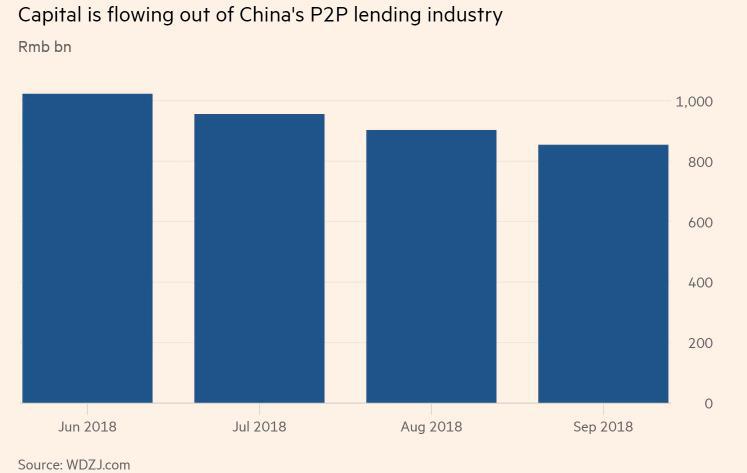China’s peer-to-peer lenders expect their numbers to collapse from more than 1,500 to as few as 50 over the next 12 months, as regulators push through tough reforms while also barring company executives from fleeing the country.
Peer-to-peer lending, the business of connecting private lenders with borrowers online, is a $120bn industry in China and traditionally has been lightly regulated with a high risk and return profile.
But a government crackdown on debt and financial risk has brought a wave of defaults, angering investors and prompting industry executives to flee abroad to escape investigation.
Investors, often ordinary Chinese people, have taken to the streets to protest about their losses, while many executives in the industry have been barred by police from leaving the country, according to several people familiar with the matter.
Regulators are preparing to hand out licences over the next year to companies that meet a number of strict criteria, with few of the current businesses expected to make the grade, said Greg Gibb, chief executive of Lufax, one of China’s largest P2P lenders and online wealth management companies.
“Identifying those 50 to 100 companies could take place over the next 12 months,” Mr Gibb said of the official licensing process.
About 1,530 P2P companies are operating in China, according to industry intelligence company WDZJ.com. Capital has been leaving the sector at a record pace since June, with total outstanding loans falling from Rmb1.02tn to Rmb853.6bn in the four months until the end of September.
Several industry executives agreed the new wave of regulation would force most companies out of the industry, although estimations of the number of businesses that would survive ranged from a few hundred to well below 50.

Less stringent regulatory action began in 2017, but the current licensing process that kicked off several months ago has made it difficult for most companies to continue operating, said Roger Ying, founder of Beijing-based P2P lender Pandai.
“The licensing is pretty much a prolonged process designed to flush out P2Ps,” said Mr Ying, who recently sold off his stake in his business and left the industry. He believes that the forecast of even 50 survivors was optimistic.
It is not just investors that have grown wary of the clampdown. Many executives running P2P lenders in China have been barred from leaving the country in an attempt to stop the owners of failed businesses from fleeing, according to Mr Ying and two other industry insiders.
“To put it mildly, I’m happy to have exited [the industry] when I did,” Mr Ying added.
Peer-to-peer lending, the business of connecting private lenders with borrowers online, is a $120bn industry in China and traditionally has been lightly regulated with a high risk and return profile.
But a government crackdown on debt and financial risk has brought a wave of defaults, angering investors and prompting industry executives to flee abroad to escape investigation.
Investors, often ordinary Chinese people, have taken to the streets to protest about their losses, while many executives in the industry have been barred by police from leaving the country, according to several people familiar with the matter.
Regulators are preparing to hand out licences over the next year to companies that meet a number of strict criteria, with few of the current businesses expected to make the grade, said Greg Gibb, chief executive of Lufax, one of China’s largest P2P lenders and online wealth management companies.
“Identifying those 50 to 100 companies could take place over the next 12 months,” Mr Gibb said of the official licensing process.
About 1,530 P2P companies are operating in China, according to industry intelligence company WDZJ.com. Capital has been leaving the sector at a record pace since June, with total outstanding loans falling from Rmb1.02tn to Rmb853.6bn in the four months until the end of September.
Several industry executives agreed the new wave of regulation would force most companies out of the industry, although estimations of the number of businesses that would survive ranged from a few hundred to well below 50.

Less stringent regulatory action began in 2017, but the current licensing process that kicked off several months ago has made it difficult for most companies to continue operating, said Roger Ying, founder of Beijing-based P2P lender Pandai.
“The licensing is pretty much a prolonged process designed to flush out P2Ps,” said Mr Ying, who recently sold off his stake in his business and left the industry. He believes that the forecast of even 50 survivors was optimistic.
It is not just investors that have grown wary of the clampdown. Many executives running P2P lenders in China have been barred from leaving the country in an attempt to stop the owners of failed businesses from fleeing, according to Mr Ying and two other industry insiders.
“To put it mildly, I’m happy to have exited [the industry] when I did,” Mr Ying added.



















Latest comments